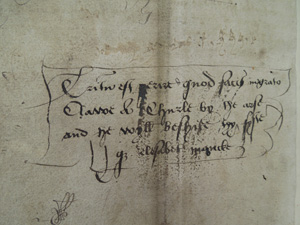Home University of Edinburgh Library Essentials
July 27, 2024
Medieval manuscripts behaving badly
Posted on February 28, 2014 | in Collections, CRC, Featured, Library | by jmarshall This 15th century manuscript of the Chronicle of England ends with some rather surprising remarks on the flyleaf:
This 15th century manuscript of the Chronicle of England ends with some rather surprising remarks on the flyleaf:
Tritu est perire quod facis ingrato [what you do is lost by thankless wear and tear]
Clawe a Churle by the arse and he wyll beshite thy fyste quod elisabet moncke
It sounds as though the 16th-century Elizabeth Monk was having a particularly bad day. Thanks to Meg Laing from Linguistics and English Language for spotting this note, which is not recorded in the catalogue.
Collections
 Archival Provenance Project: Emily’s finds
My name is Emily, and I’m the second of the two archive interns that...
Archival Provenance Project: Emily’s finds
My name is Emily, and I’m the second of the two archive interns that...
 Archival Provenance Project: a glimpse into the university’s history through some of its oldest manuscripts
My name is Madeleine Reynolds, a fourth year PhD candidate in History of Art....
Archival Provenance Project: a glimpse into the university’s history through some of its oldest manuscripts
My name is Madeleine Reynolds, a fourth year PhD candidate in History of Art....
Projects
 Sustainable Exhibition Making: Recyclable Book Cradles
In this post, our Technician, Robyn Rogers, discusses the recyclable book cradles she has developed...
Sustainable Exhibition Making: Recyclable Book Cradles
In this post, our Technician, Robyn Rogers, discusses the recyclable book cradles she has developed...
 Giving Decorated Paper a Home … Rehousing Books and Paper Bindings
In the first post of this two part series, our Collection Care Technician, Robyn Rogers,...
Giving Decorated Paper a Home … Rehousing Books and Paper Bindings
In the first post of this two part series, our Collection Care Technician, Robyn Rogers,...
